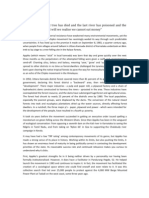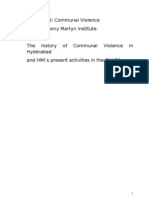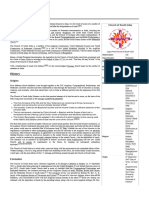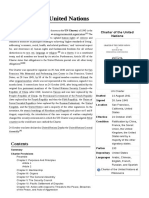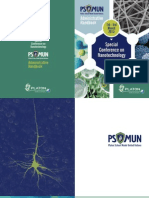Earth Summit and Ecological Crisis
Earth Summit and Ecological Crisis
Uploaded by
Sunil Kumar AroraCopyright:
Available Formats
Earth Summit and Ecological Crisis
Earth Summit and Ecological Crisis
Uploaded by
Sunil Kumar AroraCopyright
Available Formats
Share this document
Did you find this document useful?
Is this content inappropriate?
Copyright:
Available Formats
Earth Summit and Ecological Crisis
Earth Summit and Ecological Crisis
Uploaded by
Sunil Kumar AroraCopyright:
Available Formats
1
Presented By- Sunil Kumar July 7, 2010
Earth Summit and Ecological Crisis
IntroductionHuman being has always been self-centered and has paid little attention towards other co-created creation. He has left nature as a backdrop, as if he is apart from nature and not a part of nature, as if he can survive without eating or drinking or breathing. So he has used, misused and abused the God-given nature, which was handed over to him to be cared for. But in the recent history of last two-three decades much attention has been given towards ecological concerns both in secular and religious thinking, in Christianity and other religions. Dealing with ecological issues of climate change and ecological crisis is on the plan of a good number of mission organizations, and looking at mission from the perspective of the whole creation and its peoples is a crucial part of Christian witness in this present scenario. Many have written to draw attention towards this issue and many conferences and consultation have been taking place to address the same and to spread awareness in controlling the misuse and selfish use of the nature. In this paper I am going to talk about what is being done and what more can be done to help our environment keep healthy. Since the scope of the paper is limited, I have taken for granted that we know what ecological crisis is, how it is created and what are its results. So in this paper I will be talking about the biblical mandate to care for the nature and then how can church respond to this issue. In this effort, first I will mention the milestone Earth Summit and then go ahead with biblical mandate and Christian Movement and Church response to it. The Earth SummitOn June 3 and 4, 1992, the Earth Summit (formally the United Nations Conference on Environment and Development or UNCED) was held in Rio de Janeiro, Brazil.1 To discuss solutions for global problems like poverty, war or the rising rift between industrialized and developing countries, government officials from 178 countries and between 20,000 and 30,000 individuals from governments, NGOs and the media took part in this historically largest assembly. The main question was how to save the global environment in the time of sustainable development. It stressed that economic and social progress relies crucially on the safeguarding of the natural resources by preventing environmental degradation.2 The UN summit paid attention on three main concepts:
An Earth Charter covering a number of principles aiming at development and the protection of the environment, was the first focus for discussion. Secondly, "Agenda 21" was intended to be a global action plan for sustainable development; thirdly, developing countries demanded a substantial increase in new funding from developed countries to contribute to sustainable development in the South.3
After UNCED/Rio there were number of global UN conferences discussing on various action plans for human development. Governments met in 1994 for the Cairo Conference on Population and Development; in 1995 for the Copenhagen Social Development Summit and the Beijing Conference on Women and Development; in 1996 the Istanbul conference on Human Settlements and the Food Summit in Rome. They agreed on climate, biodiversity, desertification, access to information, persistent organic pollutants (POP) etc.4 The center of post-Rio action plan focused on the Commission on Sustainable Development (CSD). Its main focus is observing and executing Agenda 21. It also includes carrying out activities related to environmental and developmental objectives throughout the UN system, getting and examining information
1 2
http://www.pollutionissues.com/Co-Ea/Earth-Summit.html (4-7-2010) http://www.worldsummit2002.org/index.htm?http://www.worldsummit2002.org/guide/unced.htm (4-7-2010) 3 http://www.worldsummit2002.org/index.htm?http://www.worldsummit2002.org/guide/unced.htm (4-7-2010) 4 http://www.worldsummit2002.org/index.htm?http://www.worldsummit2002.org/guide/unced.htm (4-7-2010)
from governments and NGOs, improving discussion with NGOs, and applying environmental action plan. But from the beginning onwards there were some loopholes, there was lack of disagreement on some issues. Thus, the December 2001 report issued by UN Secretary-General Kofi Annan concluded that progress towards the goals established at Rio has been slower than anticipated and in some respects conditions are worse than they were ten years ago.5 Though Rio conference could not meet its desired goals but it has geared the whole world towards paying attention to ecological crisis. Let us now examine how Christianity is dealing with this present crisis, by observing what Bible says about this: Bible and EcologyOnce in a history we thought that ecological crisis was not a serious problem for us in the developing countries. We imagined that our problem was confined to poverty and economic exploitation and other matters related to it. But in the present context it has been a crucial issue that we need to address very urgently. Especially in religious milieu, Christianity has been viewed egotistical towards nature and blamed with being the historical root of our ecological crisis. It is therefore appropriate that we explore the Christian and Biblical basis of environmental protection and stewardship, ask the question, what is the root of our ecological crisis? Let us address this criticism by presenting ecological concerns and our mission in this perspective from a Biblical and Christian worldview and challenge all Christians to apply the Biblical principles of Christian stewardship to the use of Gods Creation. 1- The whole universe is created by God: Bible begins with Gods creation of the universe and all living creatures. Creation is an expression of an intimate relationship between God-nature-humanity. It was created that living beings may continue to live by it.6 (Gen. 1:1; John 1:1-3; Is. 45:12; Jer. 27:5). 2- Humanity has been entrusted with special responsibility to care for the whole creation: Human being was given the responsibility to serve and preserve the creation.7 (Gen 1:27-30; Gen 2:15). The creator placed man and woman in-charge of the earth to manage and not to destroy. 3- The whole creation is a gift of God to humanity: The creation of God supplies all the needs of life so it is to be considered as a gift from the Creator.8 (Gen 2:16-17; Ps 67:6). 4- Humanity is the steward of Gods creation but it still belongs to God: Even though the whole universe is given to human being but it still belongs to God, and God wants it to be preserved and cared for (Ps 24:1). 5- With human being God is also interested in the redemption of whole creation: God cares for the whole creation, even for a small sparrow (Luke 12:6), and He is interested in the redemption of His creation too (Romans 8:19-20). The Ecological Crisis and Christian Movements From last two to three decades there has been a strong emphasis to preserve the natural resources of creation in theological and missiological discussion of the church. In its discussions it was identified that poor and less-privileged people are its primary victims. So it is understood that ecological crisis is rightly the cry of the poor.9 Many Christian organizations and denominations have taken the steps ahead to address this crucial issue in their meetings. For more than twenty-five years the WCC has been engaged in making efforts within its own worldwide community to develop a faith-based understanding of the mutual
5
http://www.pollutionissues.com/Co-Ea/Earth-Summit.html (4-7-2010) Per Larsson, Your will be Done on Earth, (Hong Kong: Christian Conference of Asia, 2004), 37. 7 George Samuel, Ecology and Mission, in Doing Mission in Context, edited by Sunanda Sumithra and F. Hranghkuma, (Banglore: Theological Book Trust, 1995), 141. 8 George Samuel, Ecology and Mission, 141. 9 K.C. Abraham, A Theological Response to the Ecological Crisis, in Ecotheology: Voices from South and North, edited by David J. Hallman, (New York: Orbis Books, 1994), 66.
interrelationship between social justice, human development and protection of the environment. It has been paying attention on this crucial issue by organizing consultations, sponsoring various gatherings in different parts of the world and encouraging churches to be sensitive towards ecological concerns. Justice, Peace and Integrity of Creation has been a strong focus from Vancouver, 1983 assembly onwards and it is followed up in different international and regional WCC sponsored gatherings.10 At the 2002 World Summit on Sustainable Development, Christian representatives emphatically uttered their concern that sustainable development must be directed toward a genuine obligation to care for the poor, the marginalized and the voiceless.11 On 14-16 January 2009 the Southern African Missiological Society held one of a series of conferences related to Edinburgh 2010 themes. Dr. Sam Kobia, General Secretary of the WCC was one of the speakers. In this mission conference the morning devotions paid attention on the role of trees in scripture and society. On the final morning of the congress as a symbol of their discussion, delegates planted an olive tree.12 Christian Faith and the Earth is an international, collaborative research project which is working on ecology and Christian doctrine led by Dr. Ernst Conradie, Department of Religion and Theology, University of the Western Cape, South Africa. It is working toward a Symposium (seminar) in 2012.13 Catholics have also taken the initiative for ecological concern. On 12-16 May 2009, there was SEDOS (Service of Documentation and Study on Global Mission) seminar on Justice, Peace and the Integrity of Creation (JPIC), under the main theme, Creation at the Heart of Mission where these subjects were discussed, 1. Science and theology: the story of the universe, 2. Ecology and Jesus Christ: ecological conversion, 3. Eucharist and ecology, 4. Final redemption of all things.14 Churchs Response to Ecological CrisisQuoting the draft of WCCs JPIC seminar, P.J. Sanjeeva Raj says that the survival of creation requires that we receive the challenge of preserving and stewarding our environment and educating our congregations and individuals to do the same with necessity and dedication.15 The problem is that Christian theology and mission have been anthropocentric (human-centered) and have taken the natural world for granted. But as we face the present ecological crisis Christian mission and church has to play a key role in addressing this crisis. K.C. Abraham suggests three kinds of models for the church to follow in order to be in harmony with the God-given nature. Firstly, Ascetic or Monastic Model,16 in this he mentions that giving up the greed and being satisfied with the minimum will help to preserve the nature. Secondly, Sacrament/Eucharist Model, 17 in this he argues that nature should be taken as the gift from God and as eucharist is shared, all the blessings of the nature are to be shared with all. This can be shared only if it is cared for and preserved. Thirdly, Liberative solidarity Model,18 in this he proposes that church needs to be in solidarity with the creation. We need to keep in mind that with human beings creation is also looking for redemption. If the church has this view in her mind, she will strive hard to be in solidarity with nature. In addition to these models church can take some down-to-earth initiatives like organizing awareness camps and seminars to learn more about ecological crisis and how to handle it, partnering with societies which are involved in ecological development, arranging spiritual meetings where the sermons may be
10 11
R.L. Sarkar, The Bible, Ecology and Environment, (New Delhi: ISPCK, 2000), 263-264. Willis Jenkins, Missiology in Environmental Context: Tasks for an Ecology of Mission, International Bulletin of Missionary Research, vol. 32, no. 4 (October 2008): 181. 12 http://www.edinburgh2010.org/en/study-themes/transversal-topics/7-ecological-perspectives-in-mission.html (4-7-2010) 13 http://www.edinburgh2010.org/en/study-themes/transversal-topics/7-ecological-perspectives-in-mission.html (4-7-2010) 14 http://www.edinburgh2010.org/en/study-themes/transversal-topics/7-ecological-perspectives-in-mission.html (4-7-2010) 15 P.J. Sanjeeva Raj, Ecology and Development: A Theological Perspective, in Ecology and Development: Theological Perspectives, edited by Daniel D. Chetti (UELCI/GURUKUL & BTE/SSC, 1991), 60 16 K.C. Abraham, A Theological Response to the Ecological Crisis, 71. 17 K.C. Abraham, A Theological Response to the Ecological Crisis, 72. 18 K.C. Abraham, A Theological Response to the Ecological Crisis, 72.
given on environmental issues and encouraging people for caring the environment as Gods desire, praying for the nature and so on.19 Some Steps towards an Improved Ecological System Let us reflect on some of the collective ways by which we can respond to ecological crisis in a positive manner. Firstly, the growth model must be changed.20 In this kind of model rural and natural environment is exploited for the benefit of dominant classes. So the dominant model of development should be rejected and a commitment should be made towards ecologically sustainable form of development. Secondly, ecological crisis should be taken as justice issue.21 Justice means all may have a safe and healthy place to live, work and participate and at the same time making sure that there are enough resources for everyone now and in the future.22 It is recognized that that poor are the ones who are the most affected people by ecological crisis and if we dont make efforts to save our environment we do injustice to them. So we need to do justice to fellow beings and to environment. Thirdly, we need to apply the principle of care towards the nature. 23 Until and unless we care for the nature we cannot do justice to nature. We no longer can consider ourselves as ruler of the nature in the present situation of ecological crisis, so an ethics of care needs to be applied. Fourthly, we need to develop an attitude of interdependence with the nature.24 The main reason behind ecological crisis is conflict between humans and nature.25 Nature and human beings mutually depend on one other. In the ecological unit, whatever one component does or anything that happens to one element of the unit has some outcome for all other elements.26 We belong to nature and nature belongs to us. And when we have the attitude of interdependence with nature we will be more responsible to care for it. ConclusionIn this paper I have talked about the ecological crisis and how it is bothering the whole secular and religious world. I have also discussed that how we can make attempts to protect our environment. In conclusion I emphasize that there is a need of ecological stewardship in terms of partnership; I mean that humankind should be seen as part of creation rather than its master, and at the same time recognizing a special relationship with God and ecological accountability under God. In present context preserving the environment should be taken as a mission activity and our missiology must find ways to name and condemn environmental misuse, to promise environmental health, to offer ecological restoration, and to invite the world into a geography of grace.27 Keeping humanity at the center can lead to abuse of environment than to take the responsibility to care for it. On the other side keeping the nature as Gods creation in the center leads humanity to give it its proper value and take the responsibility to care for it,28 because Mission begins with humanity but finally results in the renewal of all creation.29 So let us be a good steward of the gift, the nature, God has given us by utilizing it and being responsible to care for it.
19
David Rhoads, The Role of the Church in the Care of the Earth, 412. http://search.ebscohost.com/login.aspx?direct=true&db=rfh&AN=ATLA0001758505&site=ehost-live (4-7-2010) 20 K.C. Abraham, A Theological Response to the Ecological Crisis, 66. 21 K.C. Abraham, A Theological Response to the Ecological Crisis, 66. 22 Mwayuli, Genevieve A. and Kadenyi, Mista MM. Environmental Justice for Peace and Development: A Biblical Perspective African Ecclesial Review, No 4-1(Dec. 2009-March 2010), 532. http://search.ebscohost.com/login.aspx?direct=true&db=rfh&AN=ATLA0001758505&site=ehost-live (4-7-2010) 23 K.C. Abraham, A Theological Response to the Ecological Crisis, 68. 24 K.C. Abraham, A Theological Response to the Ecological Crisis, 69. 25 Christina Manohar, Towards a Theology of Environment, in Ecological Challenge and Christian Mission, edited by Krickwin C. Marak and Atul Y. Aghamkar, (Delhi: CMS/ISPCK, 1998), 185. 26 Mwayuli, Genevieve and Kadenyi, Environmental Justice for Peace and Development: A Biblical Perspective, 537. 27 Willis Jenkins, Missiology in Environmental Context: Tasks for an Ecology of Mission, 178. 28 Clive Ayre, The Church in the Eco-crisis http://www.csu.edu.au/special/accc/worddocs/Papers%20&%20Publications/AAMS%20missions%20conference/Ayre.pdf (4-72010) 29 Willis Jenkins, Missiology in Environmental Context: Tasks for an Ecology of Mission, 180.
Bibliography
Ayre, Clive The Church in the Eco-crisis http://www.csu.edu.au/special/accc/worddocs/Papers%20&%20Publications/AAMS%20missions%20confe rence/Ayre.pdf Abraham, K.C. A Theological Response to the Ecological Crisis. In Ecotheology: Voices from South and North. Edited by David J. Hallman. New York: Orbis Books, 1994. http://www.edinburgh2010.org/en/study-themes/transversal-topics/7-ecological-perspectives-inmission.html http://www.pollutionissues.com/Co-Ea/Earth-Summit.html http://www.worldsummit2002.org/index.htm?http://www.worldsummit2002.org/guide/unced.htm Jenkins, Willis. Missiology in Environmental Context: Tasks for an Ecology of Mission. International Bulletin of Missionary Research, vol. 32, no. 4 (October 2008): 176-184. Larsson, Per. Your will be Done on Earth Hong Kong: Christian Conference of Asia, 2004. Manohar, Christina. Towards a Theology of Environment. In Ecological Challenge and Christian Mission. Edited by Krickwin C. Marak and Atul Y. Aghamkar. Delhi: CMS/ISPCK, 1998. Mwayuli, Genevieve A. and Mista Kadenyi,. M.M. Environmental Justice for Peace and Development: A Biblical Perspective. African Ecclesial Review. http://search.ebscohost.com/login.aspx?direct=true&db=rfh&AN=ATLA0001758505&site=ehost-live Rhoads, David. The Role of the Church in the Care of the Earth. http://search.ebscohost.com/login.aspx?direct=true&db=rfh&AN=ATLA0001758505&site=ehost-live Samuel, George. Ecology and Mission. In Doing Mission in Context. Edited by Sunanda Sumithra and F. Hranghkuma. Banglore: Theological Book Trust, 1995. Sanjeeva Raj, P.J. Ecology and Development: A Theological Perspective. In Ecology and Development: Theological Perspectives. Edited by Daniel D. Chetti. UELCI/GURUKUL & BTE/SSC, 1991. Sarkar, R.L. The Bible, Ecology and Environment. New Delhi: ISPCK, 2000.
You might also like
- Notes in Contemporary World PDFDocument12 pagesNotes in Contemporary World PDFVeneice Amor Alonzo84% (37)
- Human Rights Education HandbookDocument178 pagesHuman Rights Education Handbookbeniamino79No ratings yet
- The Mysteries of Christ in The Book of GenesisDocument167 pagesThe Mysteries of Christ in The Book of GenesisTaurai MakadhoNo ratings yet
- Philosophy and Sociology of ScienceDocument6 pagesPhilosophy and Sociology of SciencereginNo ratings yet
- EducationDocument10 pagesEducationKiran DNo ratings yet
- ICT Sir pAOLENDocument7 pagesICT Sir pAOLENThangtinpao HaokipNo ratings yet
- Noel Sheth - Hindu Avatara and Christian Incarnation - A ComparisonDocument29 pagesNoel Sheth - Hindu Avatara and Christian Incarnation - A ComparisonJanardan DasNo ratings yet
- Contributions of Educators For Liberation Praxis - John DeweyDocument14 pagesContributions of Educators For Liberation Praxis - John DeweyJithinNo ratings yet
- Jesus As Avatar and Holy SpiritDocument9 pagesJesus As Avatar and Holy SpiritJemimah GladysNo ratings yet
- Christology by Samuel George - Compressed - NocoverDocument69 pagesChristology by Samuel George - Compressed - Nocovermasterscollegeoffice57No ratings yet
- Feminist PneumatologyDocument6 pagesFeminist PneumatologyRatheesh RsNo ratings yet
- Social Structure, Ideology and Language-Caste Among MuslimsDocument4 pagesSocial Structure, Ideology and Language-Caste Among MuslimsuvaisahamedNo ratings yet
- Assignment Role of Women in The Early ChurchDocument10 pagesAssignment Role of Women in The Early ChurchSIMEON BALINo ratings yet
- Earth Ethics of M.K. Gandhi With Teachings From Holy Mother AmmaDocument112 pagesEarth Ethics of M.K. Gandhi With Teachings From Holy Mother AmmaWiseEarthPublishersNo ratings yet
- Jesus As SatguruDocument11 pagesJesus As SatguruDaniesNo ratings yet
- Body FinalDocument30 pagesBody FinalHarley Dadia PigaNo ratings yet
- Inculturation in MissionDocument7 pagesInculturation in Missionsolomon sNo ratings yet
- State (Polity)Document12 pagesState (Polity)Ruben PobleteNo ratings yet
- Nature and Need of ICTDocument13 pagesNature and Need of ICTHmingsanga ChhakchhuakNo ratings yet
- Lecture 3 (The Metaphors and Images of The Church)Document5 pagesLecture 3 (The Metaphors and Images of The Church)Reegan SamsonNo ratings yet
- Mudit Jain Fundamentalism Secularism Notes PDFDocument19 pagesMudit Jain Fundamentalism Secularism Notes PDFJojo NutNo ratings yet
- Tribes and Urbanisation in North East India PDFDocument16 pagesTribes and Urbanisation in North East India PDFAashish KhakhaNo ratings yet
- ST Robert Bellarmine Conciliarism and The Limits of Papal Power - Christian D. WashburnDocument20 pagesST Robert Bellarmine Conciliarism and The Limits of Papal Power - Christian D. WashburnNama PalsuNo ratings yet
- Appiko MovementDocument5 pagesAppiko Movement1993raghuram100% (1)
- Cyber Ethics IssuesDocument8 pagesCyber Ethics IssuesThanmiso LongzaNo ratings yet
- Tribal Epistemology MadhuDocument5 pagesTribal Epistemology MadhuLoren100% (1)
- Wati LongcharDocument11 pagesWati LongcharL. B. Christian M.P. Media100% (1)
- MissioDocument5 pagesMissioamosabiaktluangaNo ratings yet
- NEICCDocument7 pagesNEICCDavid Lalnunthara DarlongNo ratings yet
- Christianity's Contribution To IndiaDocument6 pagesChristianity's Contribution To IndiaSam JeromeNo ratings yet
- Feminist Re-Reading Bible With New Eyes - 085256Document7 pagesFeminist Re-Reading Bible With New Eyes - 085256Lalrinpuia RalteNo ratings yet
- Book of Proverbs - AmosDocument5 pagesBook of Proverbs - AmosRohit Hans Hans100% (1)
- Appiko MovementDocument3 pagesAppiko MovementUjjwal SuperTramp Rai100% (1)
- The History of Communal Violence in Hyderabad and The Henry Martyn Institute.Document77 pagesThe History of Communal Violence in Hyderabad and The Henry Martyn Institute.Piet Kruizinga100% (1)
- Maturity in Interpersonal RelationshipsDocument6 pagesMaturity in Interpersonal Relationshipsmaduragayakan100% (1)
- Pauline Mission and Missionary Journeys and Missionary StrategiesDocument22 pagesPauline Mission and Missionary Journeys and Missionary Strategiesbenji69911060No ratings yet
- Communalism and IndiaDocument7 pagesCommunalism and IndiaLakshay BatraNo ratings yet
- AppikoDocument3 pagesAppikoSubash PrakashNo ratings yet
- Significance of Luther's Hermeneutics!Document22 pagesSignificance of Luther's Hermeneutics!Rh2223dbNo ratings yet
- Missio Dei and Holistic MissionDocument12 pagesMissio Dei and Holistic MissionAkash SuryaNo ratings yet
- The Concept of Jesus As An Avatar by Vengal ChakkaraiDocument5 pagesThe Concept of Jesus As An Avatar by Vengal Chakkaraistephenkiransam100% (2)
- Nine Theses On Social MovementsDocument23 pagesNine Theses On Social MovementsNoor AmeenaNo ratings yet
- Semi PelagianismDocument1 pageSemi PelagianismtwinscrewcanoeNo ratings yet
- Caste System and Biblical RespondDocument9 pagesCaste System and Biblical RespondLal Bahadur Luhar100% (1)
- Sarvodaya and Bhoodan MovementDocument7 pagesSarvodaya and Bhoodan MovementLalrinpuia RalteNo ratings yet
- Theological Understanding of Low Self EsteemDocument9 pagesTheological Understanding of Low Self EsteemVioto N Katty100% (1)
- Pauline Economic MutualismDocument4 pagesPauline Economic MutualismDavid Lalnunthara DarlongNo ratings yet
- Assignment On A Detailed Study of Hindu Religious TraditionDocument6 pagesAssignment On A Detailed Study of Hindu Religious TraditionLal LawmsangaNo ratings yet
- ICTEcclesiologyseminarDocument11 pagesICTEcclesiologyseminarbibin100% (1)
- Contectualization Indigenization IncultrationDocument11 pagesContectualization Indigenization Incultrationmydailyhope21No ratings yet
- 1 18 Muslim Christian Dialogue CSC Volume 2 Issue 1 PDFDocument18 pages1 18 Muslim Christian Dialogue CSC Volume 2 Issue 1 PDFAasia RashidNo ratings yet
- Indian Pentecostal Church of GodDocument8 pagesIndian Pentecostal Church of Godwattssteve21No ratings yet
- Conversion As A Hate Issue A Study On TH PDFDocument18 pagesConversion As A Hate Issue A Study On TH PDFVivek SlpisaacNo ratings yet
- Joyel ICT AssignmentDocument11 pagesJoyel ICT Assignmentsamuel sammyNo ratings yet
- Senate Syllabus - 1 BDDocument22 pagesSenate Syllabus - 1 BDJoeNo ratings yet
- Church of South IndiaDocument7 pagesChurch of South Indiamcdermott45No ratings yet
- Notes CH 1 - Modern Period in Indian HistoryDocument2 pagesNotes CH 1 - Modern Period in Indian HistoryAdi Kailasnath Pethakar100% (1)
- Community of Service, Love and Fellowship in Johan's GospelDocument7 pagesCommunity of Service, Love and Fellowship in Johan's Gospeldiamond krishna dasNo ratings yet
- (A) .I. Laity in The Church Identity and Mission in IndiaDocument16 pages(A) .I. Laity in The Church Identity and Mission in IndiaPhiloBen KoshyNo ratings yet
- United Nations Security Council Veto PowerDocument8 pagesUnited Nations Security Council Veto PowerWaqas KhanNo ratings yet
- UT3 SyllabusDocument84 pagesUT3 SyllabusMohan Chand Reddy ANo ratings yet
- 6th Report of Commission of Inquiry On Syria - A/HRC/24/46Document42 pages6th Report of Commission of Inquiry On Syria - A/HRC/24/46UK Mission to the UNNo ratings yet
- UN Security Council-Counterterrorism sanctions-UN Sanctions Committees-Judicial Review-Assets Freezing-Right To Be HeardDocument8 pagesUN Security Council-Counterterrorism sanctions-UN Sanctions Committees-Judicial Review-Assets Freezing-Right To Be Heardshahab88No ratings yet
- United Nations Security Council ReformDocument24 pagesUnited Nations Security Council ReformJames WeirNo ratings yet
- Objectives of Foreign Policy of PakistanDocument4 pagesObjectives of Foreign Policy of Pakistanasis93% (15)
- The History of UNDocument7 pagesThe History of UNHathenah IbarrientosNo ratings yet
- Charter of The United NationsDocument8 pagesCharter of The United NationsJavier UgazNo ratings yet
- JTXT9000781408 Nalsar Public International Law Moot 01 2021 Shrutishambhavi2023 Bitslawschooleduin 20230828 153226 1 20Document20 pagesJTXT9000781408 Nalsar Public International Law Moot 01 2021 Shrutishambhavi2023 Bitslawschooleduin 20230828 153226 1 20Shruti ShambhaviNo ratings yet
- Ethics in Peace OperationsDocument160 pagesEthics in Peace OperationsGermán CarmeliniNo ratings yet
- On Child Protection: Specialised Training MaterialsDocument24 pagesOn Child Protection: Specialised Training MaterialsLydia Lobrino Ali-aliNo ratings yet
- gr2p Article p3 - 002Document27 pagesgr2p Article p3 - 002yijebim859No ratings yet
- The United Nations: "Term Report"Document19 pagesThe United Nations: "Term Report"Farooq AhmedNo ratings yet
- Nternational Ourt OF Ustice: Nalsar Unhcr P I L M C C, 2021Document40 pagesNternational Ourt OF Ustice: Nalsar Unhcr P I L M C C, 2021Khushi KhuranaNo ratings yet
- MRRS Protocol and GCRVsDocument47 pagesMRRS Protocol and GCRVsRoh MihNo ratings yet
- PS-MUN BrochureDocument14 pagesPS-MUN BrochurePs Mun100% (1)
- UNICEF - VacanciesDocument7 pagesUNICEF - Vacanciesyulin2805No ratings yet
- 'Sexual Violence Against Indigenous Jumma Women in The Chittagong Hill Tracts (CHT), BangladeshDocument3 pages'Sexual Violence Against Indigenous Jumma Women in The Chittagong Hill Tracts (CHT), BangladeshchtnewsupdateNo ratings yet
- Unit 1: History of Peace Education: If I Have Seen Further Than Others, It Is by Standing On The Shoulders of GiantsDocument16 pagesUnit 1: History of Peace Education: If I Have Seen Further Than Others, It Is by Standing On The Shoulders of GiantsMeljon AbasolaNo ratings yet
- No One Is More Precious Than A Faithful Friend: Johanes Baptista Adhi SamudroDocument2 pagesNo One Is More Precious Than A Faithful Friend: Johanes Baptista Adhi SamudroAndi RafsanjaniNo ratings yet
- Allott - State Responsibility and The Unmaking of International LawDocument27 pagesAllott - State Responsibility and The Unmaking of International LawEunice Lau100% (2)
- The Global Interstate SystemDocument35 pagesThe Global Interstate SystemKwenzie Fortaleza100% (1)
- Religion and Globalization New Possibilities Furthering ChallengesDocument11 pagesReligion and Globalization New Possibilities Furthering ChallengesUly SalvadorNo ratings yet
- Exceptional ChildrenDocument9 pagesExceptional ChildrenEarl Cope0% (1)
- Human Rights - A Tool For Governing Muslims - The Muslim SkepticDocument3 pagesHuman Rights - A Tool For Governing Muslims - The Muslim SkepticAkmalNo ratings yet
- United Nations Organization PDF For SSC and Railway ExamsDocument8 pagesUnited Nations Organization PDF For SSC and Railway ExamsDeepak ModiNo ratings yet
- EIA1Document67 pagesEIA1Nithin SanthoshNo ratings yet
- United Nations Organization Irrevocable Payment OrderDocument1 pageUnited Nations Organization Irrevocable Payment OrderYuenNo ratings yet

































